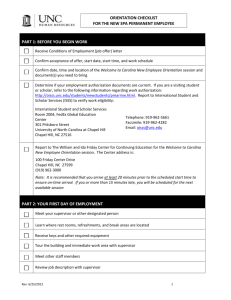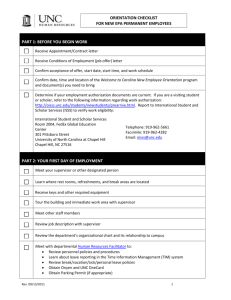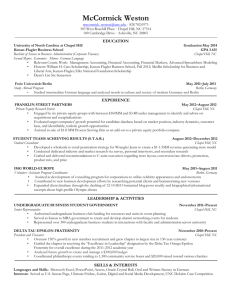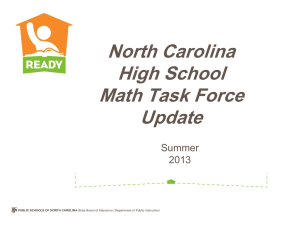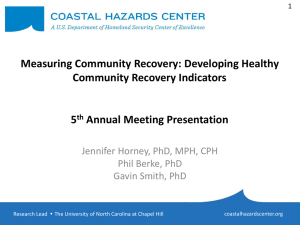Conference Program - Kennesaw State University
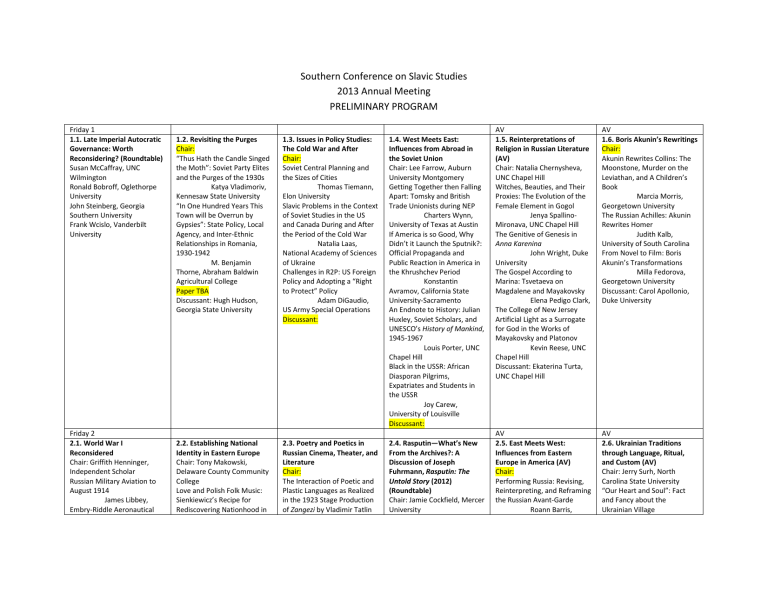
Southern Conference on Slavic Studies
2013 Annual Meeting
PRELIMINARY PROGRAM
Friday 1
1.1. Late Imperial Autocratic
Governance: Worth
Reconsidering? (Roundtable)
Susan McCaffray, UNC
Wilmington
Ronald Bobroff, Oglethorpe
University
John Steinberg, Georgia
Southern University
Frank Wcislo, Vanderbilt
University
Friday 2
2.1. World War I
Reconsidered
Chair: Griffith Henninger,
Independent Scholar
Russian Military Aviation to
August 1914
James Libbey,
Embry-Riddle Aeronautical
1.2. Revisiting the Purges
Chair:
“Thus Hath the Candle Singed the Moth”: Soviet Party Elites and the Purges of the 1930s
Katya Vladimoriv,
Kennesaw State University
“In One Hundred Years This
Town will be Overrun by
Gypsies”: State Policy, Local
Agency, and Inter-Ethnic
Relationships in Romania,
1930-1942
M. Benjamin
Thorne, Abraham Baldwin
Agricultural College
Paper TBA
Discussant: Hugh Hudson,
Georgia State University
2.2. Establishing National
Identity in Eastern Europe
Chair: Tony Makowski,
Delaware County Community
College
Love and Polish Folk Music:
Sienkiewicz’s Recipe for
Rediscovering Nationhood in
1.3. Issues in Policy Studies:
The Cold War and After
Chair:
Soviet Central Planning and the Sizes of Cities
Thomas Tiemann,
Elon University
Slavic Problems in the Context of Soviet Studies in the US and Canada During and After the Period of the Cold War
Natalia Laas,
National Academy of Sciences of Ukraine
Challenges in R2P: US Foreign
Policy and Adopting a “Right to Protect” Policy
Adam DiGaudio,
US Army Special Operations
Discussant:
2.3. Poetry and Poetics in
Russian Cinema, Theater, and
Literature
Chair:
The Interaction of Poetic and
Plastic Languages as Realized in the 1923 Stage Production of Zangezi by Vladimir Tatlin
1.4. West Meets East:
Influences from Abroad in the Soviet Union
Chair: Lee Farrow, Auburn
University Montgomery
Getting Together then Falling
Apart: Tomsky and British
Trade Unionists during NEP
Charters Wynn,
University of Texas at Austin
If America is so Good, Why
Didn’t it Launch the Sputnik?:
Official Propaganda and
Public Reaction in America in the Khrushchev Period
Konstantin
Avramov, California State
University-Sacramento
An Endnote to History: Julian
Huxley, Soviet Scholars, and
UNESCO’s History of Mankind,
1945-1967
Louis Porter, UNC
Chapel Hill
Black in the USSR: African
Diasporan Pilgrims,
Expatriates and Students in the USSR
Joy Carew,
University of Louisville
Discussant:
2.4. Rasputin—What’s New
From the Archives?: A
Discussion of Joseph
Fuhrmann, Rasputin: The
Untold Story (2012)
(Roundtable)
Chair: Jamie Cockfield, Mercer
University
AV
1.5. Reinterpretations of
Religion in Russian Literature
(AV)
Chair: Natalia Chernysheva,
UNC Chapel Hill
Witches, Beauties, and Their
Proxies: The Evolution of the
Female Element in Gogol
Jenya Spallino-
Mironava, UNC Chapel Hill
The Genitive of Genesis in
Anna Karenina
University
John Wright, Duke
The Gospel According to
Marina: Tsvetaeva on
Magdalene and Mayakovsky
Elena Pedigo Clark,
The College of New Jersey
Artificial Light as a Surrogate for God in the Works of
Mayakovsky and Platonov
Kevin Reese, UNC
Chapel Hill
Discussant: Ekaterina Turta,
UNC Chapel Hill
AV
1.6. Boris Akunin’s Rewritings
Chair:
Akunin Rewrites Collins: The
Moonstone, Murder on the
Leviathan, and A Children’s
Book
Marcia Morris,
Georgetown University
The Russian Achilles: Akunin
Rewrites Homer
Judith Kalb,
University of South Carolina
From Novel to Film: Boris
Akunin’s Transformations
Milla Fedorova,
Georgetown University
Discussant: Carol Apollonio,
Duke University
AV
2.5. East Meets West:
Influences from Eastern
Europe in America (AV)
Chair:
Performing Russia: Revising,
Reinterpreting, and Reframing the Russian Avant-Garde
Roann Barris,
AV
2.6. Ukrainian Traditions through Language, Ritual, and Custom (AV)
Chair: Jerry Surh, North
Carolina State University
“Our Heart and Soul”: Fact and Fancy about the
Ukrainian Village
University
Russia and the Origins of
World War I
Ronald Bobroff,
Oglethorpe University
World War I Soldiers’
Experience: The View from
Censored Letters and
Ethnographies
Karen Petrone,
University of Kentucky
Discussant:
Friday 3
3.1. Rumor Has It: Informal
Informational Networks in
Russian and Soviet History
Chair: Adrianne Jacobs, UNC
Chapel Hill
It’s the End of the World as
We Know It: Soviet Jehovah’s
Witnesses and the
Armageddon Scare of 1975
Emily Baran,
Middle Tennessee State
University
“After the War, All the Land
Will Be Ours”: Russian
Peasant Rumors During World
War I
Colleen Moore,
Indiana University
The Rise and Fall of “Agent
Burtnieks”: Rumors, the Story “Yanko the
Musician”
Victoria Vutova,
University of Virginia
Determining National Loyalty in Contested States: Loyalty
Trials in the Hungarian-Slovak
Borderlands, 1938-1945
Leslie Waters,
College of William and Mary
Explaining Soviet “West” and
Soviet “Exotic”: Lithuanian and Georgian Soviet Writers from “Engineering” to
“Mobilizing” Human Souls
Vilius Ivanauskas,
University of California-
Berkeley
The Struggle for National
Identity in the Republic of
Moldova
Valentin Ştefan,
UNC Chapel Hill
Discussant: Letitia Guran,
Highpoint University
3.2. Parallels in Russian
Literature
Chair: Martha Kuchar,
Roanoke College
Colonized Maps, Imagined
Spaces: Double-Consciousness and Diaspora in Fyodor
Dostoevsky’s Krokodil (1865) and Tahar Ben Jelloun’s Partir
(2006)
Michele Frucht
Levy, North Carolina A&T
University
Exploring the Dark Side:
Versilov as the Devil in
Dostoevsky’s A Raw Youth
Katya Jordan,
University of Virginia
Woland and Afranius: Linked
Characters
Kristina Anilane,
Complutense University of
Madrid
Amorphous Forms: Cinematic
Subjectivity in Shadows of
Forgotten Ancestors
Robert Efird,
Virginia Tech
The Metaphor of the Garden in the Early Poetry of Joseph
Brodsky
Elena Dimov,
Univsersity of Virginia
Discussant: Sarah Krive, UNC
Greensboro
3.3. Relief in Revolutionary
Russia
Chair:
Out of Humanity’s Sake:
Empress Alexandra and the
POW Crisis
Griffith Henninger,
Independent Scholar
Americans by Training: Polish in Hear: The American Relief
Administration’s Grey
Samaritans
Matthew Adams,
Savannah Technical College
The Society for Safeguarding
Children in Estonia and
America’s Child Feeding
Program in 1919-1920
Olavi Arens,
Armstrong Atlantic State
Harold Goldberg, Sewanee:
University of the South
Frank Wcislo, Vanderbilt
University
George Munro, Virginia
Commonwealth University
3.4. The Legacy of Leaders:
Russian Rulers Reconsidered
Chair:
Decay on Display: The Funeral
Train Journeys of Abraham
Lincoln and Tsar Alexander III
Kathleen Conti,
UNC Chapel Hill
Was Nicholas II Really
Opposed to Representative
Government?
Joseph Fuhrmann,
Murray State University
Breaking Down the Man of
Steel: Stalin in Russia Today
Charles Sullivan,
George Washington
University
Discussant: Lee Farrow,
Auburn University
Radford University
Suburban Socialist Realism:
Soviet Artistic Influences in
1930s New Jersey
College of Staten Island
Petru Comarnescu in America:
A View of the West from the
East
Duke University
Discussant:
Susan Smith-Peter,
Cristina Bejan,
AV
3.5. Peripheral Visions:
Armenian, Ukrainian, and
Tatar Projects for Regional
Autonomy in Late-Imperial and Early-Soviet Russia (AV)
Chair: Louis Porter, UNC
Chapel Hill
Fractured Loyalties: State
Responses to Armenian
Nationalism in Late Imperial
Russia
Stephen Riegg,
UNC Chapel Hill
The Birth of Ukrainian “Active
Nationalism”: Dmytro
Dontsov and Heterodox
Marxism before the First
World War, 1883-1914
Trevor Erlacher,
UNC Chapel Hill
Svitlana
Kukharenko, University of
Manitoba
Linguistic “Purity”: Linguistic
Ideology in Ukraine
Susan
Vdovichenko, Washington and Jefferson College
The Unity of Words, Music, and Ritual Action in Slavic Folk
Culture
Olga Vlasova, Kiev
National University of Culture and Art
Discussant: Martha Kuchar,
Roanoke College
AV
3.6: Creating “Soviet” Forms of Art under Stalin (AV)
Chair: Robert Efird, Virginia
Tech
“Bourgeois Formalist
Decadence”: The Problematic
Politics of Malevich’s 1929
Retrospective
Joan Titus, UNC
Greensboro
Paper TBA
Discussant:
Marie Gasper-
Hulvat, The College of New
Jersey
Dmitry Shostakovich and his
Girlfriends
Informants, and Supposed
Uprisings in 1941 Riga
Friday 4
4.1. “Ain’t Nothin’ Like a Girl
Supposes”: Relationships of
Russian and Polish Actresses to the Dominant Male Others in Their Lives
Chair: Jehanne Gheith, Duke
University
A Death in Warsaw:
Wisnowska’s Murder or
Visnovskaia’s Suicide?
Louise
McReynolds, UNC Chapel Hill
Eisenstein on Directing
Women
Joan Neuberger,
University of Texas at Austin
Ziminska and Her Boys:
Backstage Warsaw
Beth Holmgren,
Duke University
Discussant: Jehanne Gheith,
Duke University
4.2. Dreaming in Russian:
Preparing Students for Study
Abroad (Roundtable)
Chair: Sarah Krive, UNC
Greensboro
Kathleen Macfie, UNC
Greensboro
Clementine Fujimura, United
States Naval Academy
Catherine O’Neil, United
States Naval Academy
Europe
William Risch,
Georgia College
Discussant: Martin Blackwell,
Gainseville State College
Saturday1
5.1. Work to War and War to
Work: Mobilization and
Demobilization in Twentieth
Century Central and Eastern
Chair: Michael Paulauskas,
Middle Tennessee State
Brendan Mooney,
University of South Carolina
Discussant:
5.2. Friends of Moldova: The
Lasting Impact of Global
Engagement and Cross-
Cultural Connections for
Development (Roundtable)
Chair: Jacqueline M. Olich,
UNC Chapel Hill
University
Discussant:
4.3. Points of Crisis with
Socialism in the Post-Stalin
Soviet Union
Chair: Donald J. Raleigh, UNC
Chapel Hill
Propaganda and Story-Telling in the Khrushchev Era
Karl Loewenstein,
University of Wisconsin
Oshkosh
On the Eve of War: The
National Soviet Exhibit in
Kabul, April-May 1979
Jeffrey Jones, UNC
Greensboro
Fashioning Soviets: Re-
Conceptualizing Soviet
Socialism, 1950s-1980s
Nina Arutyunyan,
Duke University
Perestroika Pirouettes and
Glasnost Glissades? The Kirov and the Bolshoi Ballet, 1977-
1991
Jennifer Buxton,
UNC Chapel Hill
Discussant: Jerry Surh, North
Carolina State University
5.3. Transmissions: Studies in the Spread of Information and Knowledge in the Late
19 th Century
Chair: Steve Sabol, UNC
Charlotte
Folk to Book: Transformations
Montgomery
4.4. Religious Influences in
History, Literature, and Policy
Chair:
How Women Have Created
Serbian Medieval History
Dominika Gapska,
Adam Mickiewicz University
(Poland)
Service and Charity in The
Brothers Karamazov
Carolyn Ayers,
Saint Mary’s University of
Minnesota
Church-Based Alcohol
Rehabilitation Programs in the
Former Soviet Union
Mark Elliott,
Asbury University
Discussant:
5.4. Reassessing the Russian
Revolution (Roundtable)
Chair: Alice Pate, Kennesaw
State University
George Enteen, Pennsylvania
State University
Rex Wade, George Mason
Stirring the Alphabet Soup:
Peripheral and Central
Agendas for the Latinization of the Tatar Alphabet, 1920-
1940
Gary Guadagnolo,
UNC Chapel Hill
Discussant: Robert Geraci,
University of Virginia
AV
4.5. Hysteria, Fear, and
Hatred in the Russian
Revolution and 1920s (AV)
Chair: Susan Smith-Peter,
College of State Island CUNY
Heroine or Hysteric? Mariia
Spiridonova’s Revolutionary
Image in 1917
Sally Boniece,
Frostburg University
Weapons of Mass Destruction and Popular Culture in the
1920s
Clayton Black,
Washington College
Did the Workers’ Opposition
Hate the Specialists?
Barbara Allen, La
Salle University
Discussant: Daniel Shafer,
Belmont University
AV
5.5. Reconsidering the Impact of World War II: Death and
Memory (AV)
Chair: Sue Rupp, Wake Forest
University
The Doomed: Mass
Mobilization to the Red Army
AV
4.6. Perspectives on 21
Kurt Shaw, Wake
Forest University
New Trends in Translation of
Modern Russian Prose
Carol Apollonio,
Duke University
Discussant: st
Century Russian Literature
Chair: Alexander Ogden,
University of South Carolina
Reading, Writing, Reflecting:
Liudmila Ulitskaia’s
Sviashchennyi musor and the
(Possible) Conclusion of a
Career
Elizabeth Skomp,
Sewanee: University of the
South
Granny Knots: Unraveling the
Past in Elena Chizhova’s Time of Women
AV
5.6. Life, Death, and Nature in Tolstoy’s Major Novels
Chair: Lara Szypszak, UNC
Chapel Hill
The Thematic Significance of
Visualization in Tolstoy’s War
and Peace
University
The Beginnings of Habsburg
Labor Mobilization in the
Ostrava-Karvina Industrial
District
Chapel Hill
John Robertson,
UNC Chapel Hill
All the Live-Long Day:
Mobilization of Kolkhoz Labor for Railroad Construction before the Battle of Kursk
Daniel Giblin, UNC
“Gateway to Freedom”: The
Friedland Refugee Camp and
Prisoner Returns from the
Communist Bloc, 1945-1956
Derek Holmgren,
UNC Chapel Hill
Discussant: Jeff Jones, UNC
Greensboro
Melissa McDonald, UNC
Chapel Hill
Rebecca Ruck, UNC Chapel
Hill
Malina Dumas, Georgetown
University
[others]
Saturday 2
6.1. Terrorism in Literature,
History, and Today
Chair: Martin Miller, Duke
University
Terrorist and Writer Boris
Savinkov: “Ubermensch” and
“Raskolnikov” of
Revolutionary Russia
Irina Vasilyeva,
University of South Carolina
Sex and the Terrorist: The
Construction of the Nigiliska in the Fin-de-Siècle Liberal
Press
Sandra Pujals,
University of Puerto Rico
“Faced with Death, Even a
Mouse Bites”: Social and
Religious Motivations Behind
Terrorism in Chechnya
Matthew Janeczko,
Loyola University Chicago
6.2. Diaspora Engagement—
Moldova Aid and Casa Mare as Case Studies in Best
Practices (Roundtable)
Chair: Robert Jenkins, UNC
Chapel Hill
Elena Draglin, Moldova Aid
Valentin Ion, Moldova Aid and
UNC Chapel Hill
Silvia Bezer, Moldova Aid and
UNC Chapel Hill??
Cristina Batog, Casa Mare
Malina Dumas, Georgetown
University of Orality in a Literate
Environment
Alexander Ogden,
University of South Carolina
“The Unhealthiest Country in the Civilized World”:
Transnational Communication
Networks During the “Russian
Flu” Epidemic, 1889-1890
Tom Ewing,
Virginia Tech
This Dark and Half-Savage
Country: Imagining Polesie at the Close of the 19 th Century
Tyler Adkins, Duke
University
Discussant: Matt Payne,
Emory University
6.3. Government Polices and
Approaches in Eastern
Europe in History and Today
Chair:
Local Self-Government in the
Municipalities of Serbia and
Bulgaria after the Congress of
Berlin, 1878
Miroslav Svircevic,
Serbian Academy of Sciences and Arts
Destabilization of the
Ukrainian Government: The
Effects of Regional
Polarization
Andriy Shymonyak,
North Carolina State
University
Serbia’s New Government and the Politics of (no)
Alternatives
Branislav Radeljić,
University
Olavi Arens, Armstrong
Atlantic State University
Michael Melancon, Auburn
University
6.4. Examining Western
Influences in Russian Art and
Culture
Chair:
The Russian Artist in Plato’s
Republic
Michelle Panchuk,
University of South Carolina
“I golova zhe byl etot
Zhorzha!”: Tolstoy, the Single
Tax, and the Kingdom of
Heaven on Earth
Jesse Stavis,
University of Wisconsin-
Madison
Decadent, but Dangerous: The
Struggle of a Soviet
Culturologist to Describe
Bourgeois Mass Culture
David Graber, UNC
Wilmington
Discussant: in the Soviet Ukraine in 1943-
44 and its Consequences
Volodymyr
Chumachenko, University of
Illinois at Urbana-Champaign
English-Speaking POW
Witnesses to Katyn: Coded
Messages, Wartime Reports, and Post-War Testimonies
Krystyna
Piorkowska, Independent
Scholar
Remembering to Forget:
Holocaust Memory in
Contemporary Estonia
Paul Stocker, West
Virginia University
The Soviets at Nuremberg: A
Reassessment
David Crowe, Elon
University
Discussant: Tony Makowski,
Delaware County Community
College
AV
6.5. A Contest of Civilizations:
Cold War Encounters from
Kitchen to Radioactive
Wasteland (AV)
Chair: Daniel Giblin, UNC
Chapel Hill
Post-Nuclear Improvisations:
Emergency Management at
Three Mile Island and
Chernobyl
Edward Geist, UNC
Chapel Hill
Midcentury Middle America:
The Soviet Agricultural
Delegation of 1955 and Its
Impressions of American
Society and Culture
Aaron Hale-Dorrell,
UNC Chapel Hill
Beyond Beef Stroganoff:
Writing Russian Cuisine in the
USSR and USA, 1965-1989
Natalia
Chernysheva, UNC Chapel Hill
A Cold, White Light: The Role of Death in Tolstoy’s War and
Peace
Jessica Ginocchio,
UNC Chapel Hill
The Sky as a Symbol of Live in
Tolstoy’s Anna Karenina
Ekaterina Turta,
UNC Chapel Hill
Discussant: Elena Pedigo
Clark, The College of New
Jersey
AV
6.6. Memory, Identity,
Language: Debates in Russia and Poland
Chair: Beth Holmgren, Duke
University
Constructing Hybridity: The
Formation of a New Polish
Jewish Identity
Danielle Guillette,
Duke University
Sociological Perspectives on
Identity Formation and
Language Contact in the
Soviet Jewish Diaspora in the
US
University
Eunice Kim, Duke
The Color of the Law:
Memory, Myth, and
Modernism in Komar and
Melamid’s Color Writing:
Ideological Abstraction No. 1
Discussant: Sue Rupp, Wake
Forest University
University of East London
The Macedonian Question in the 2013 Bulgarian
Parliamentary Elections: A
Case Study in Minority
Government Formation:?
Daniel Rueth, US
Air Force
Discussant:
Adrianne Jacobs,
UNC Chapel Hill
Discussant: Emily Baran,
Middle Tennessee State
University
(Constitution)
Serena Reiser,
Duke University
Discussants: Jehanne Gheith,
Duke University
Abigail Probert,
Duke University
